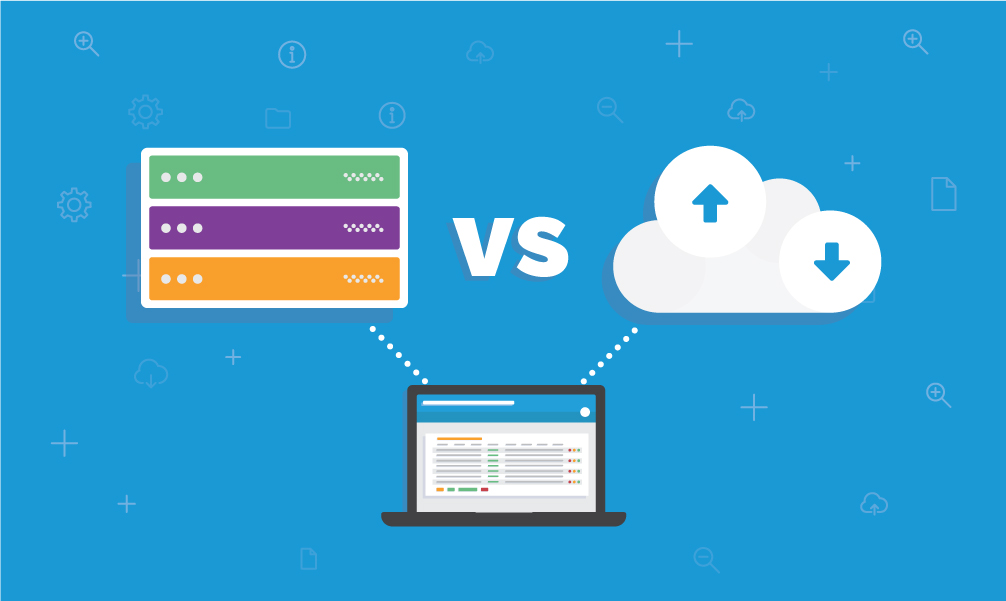You’ve no doubt heard of cloud accounting by now and how it claims to solve all of your accounting problems and more.
However, if you’re not convinced that cloud accounting is for you (or not even entirely sure what it is), we’ve put together a quick analysis of how cloud accounting measures up to traditional methods.
Cloud accounting: a simple explanation
For many people, there’s still some confusion about the difference between ‘online’ and ‘in the cloud’.
When you make an online purchase, usually you are connecting to a server or servers owned or controlled by the company from whom you’re purchasing (a server is a computer that exists to store information and/or provide services to other computers).
However, data and software held ‘in the cloud’ will be hosted on many servers in multiple locations, making them far less vulnerable to power outages, hardware and software malfunctions, theft, loss, and physical damage from a disaster such as fire or flood.
So, cloud accounting is the use of accounting software hosted on multiple remote servers rather than your own. But how does it compare to traditional accounting?
Cost
Traditional accounting: in many cases you must own the hardware, which is often expensive, to run accounting software. The hardware will have to be insured, and installed and maintained by someone with IT expertise. It may need replacing fairly regularly as the demands of ever more complex software outstrip its capabilities.
You must then purchase the software, which will need regularly updating (sometimes at a cost) or replacing, again at cost, when a newer version is published and the old version is no longer ‘supported’ (i.e. the publishers will no longer give support or take responsibility for its failure to work). As your firm grows, you will usually need to purchase additional software licences to cover more users.
Cloud accounting: you don’t require specialised hardware, as data and the accounting software are held offsite in the cloud. Some cloud accounting packages are free, but for those that come at a price, you pay a monthly subscription.
In return, you get access to the latest version of the software (with no additional costs for updates) that can normally be accessed by multiple users without additional payment. The software provider gives full support, so you don’t need an IT professional to install software or updates.
WINNER: Cloud accounting.
Accessibility
Traditional accounting: You can only access the software and data if you are on a device on which the software has been installed.
Cloud accounting: Anyone, anywhere with a secure login and internet access can use the software and access the data it holds, meaning financial admin can be done at home, while travelling, when away on business… anywhere!
Collaborative working and availability of real-time data
Traditional accounting: Data must be updated on every device using the software, so updated files need to be transferred from one device to another by email or memory stick, or downloaded from your own internal server.
Only one person has access to real-time data, or possibly any data at all, at one time, so group discussions or projects that involve access to real-time financial data aren’t possible.
Cloud accounting: Every change made is universal; any user of the software in your company can see the real-time data instantly.
There’s no need for files to be transferred manually and as many people as you like can look at and discuss the data simultaneously, which make collaboration infinitely easier.
WINNER: Cloud accounting
Environmental friendliness
Traditional accounting: You need your own hardware, which will eventually need replacing. The only way for everyone in a meeting to easily see relevant financial data is by printing out the information or displaying it via a projector that uses energy.
This also means all attendees will usually have to be in one location and travel to the meeting. You will also use more paper because of the limited storage of traditional accounting systems.
Cloud accounting: Meeting attendees can access the data on their own internet-enabled devices, which they can do from home, meaning they can use a communication app like Skype or video-conferencing to join the meeting, reducing travel and carbon emissions.
The cloud has a huge capacity for storage, reducing and possibly eliminating your need to print out data.
WINNER: Cloud accounting
Safety and security
Traditional accounting: All your data could be lost if the devices on which it’s held are lost, stolen, damaged by flood or fire etc. or start to malfunction.
The data could also be hacked by someone who accesses or steals a device, and it’s only as secure as your last security update on the device (assuming you keep your device’s security software, such as anti-virus packages, constantly updated). Transferring files by email or via memory stick also raises security concerns.
Cloud accounting: Your entire office could burn down and the devices of every staff member could be lost or stolen—yet you would still have access to all your data because it’s held safely in the cloud, on multiple servers in multiple locations.
You only need to reach an internet-enabled device to have full control of your data again. Anyone stealing a company device would have to know the secure login for your cloud accounting software to access any of your data, as nothing is held on the device itself.
As for security, that is the responsibility of your cloud accounting software provider, and it’s not only in their interest to ensure their clients’ data is secure, it’s also their primary job and skill set.
WINNER: Cloud accounting
It’s clear to see that cloud accounting is a cheaper, more secure, and altogether more accessible system than traditional accounting, so why not investigate cloud accounting if you’re still doing things the traditional way?
Pandle is a simple but multi-featured cloud accounting software package that offers both free and low-cost premium options, so take a look today and discover 21st century accounting at its finest.
